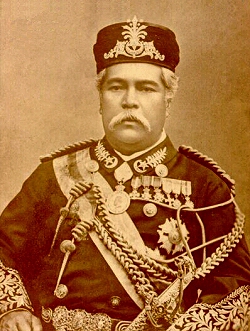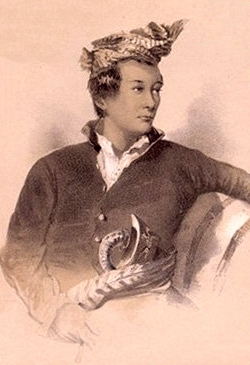
Tengku Alam Shah, Tengku Ali Iskandar Shah was a prince of the House of Bendahara (Johor), and was the oldest son of Sultan Ali, the 19th Sultan of Johor by his second wife, Daing Siti. Following his father's death in 1877, Tengku Alam and his supporters made an active pursuit to his claims for the Kesang territory and was publicly proclaimed as the Sultan of Johor and Pahang with the regnal name of Alauddin Alam Shah during his marriage ceremony in 1879. The proclamation briefly alarmed Maharaja Abu Bakar, who feared that his political position may be threatened. Within the same year, a brief civil war erupted in Jementah, after repeated attempts to get his claims to the Kesang territory being recognised failed.
Temenggong or Tumenggung is an old Malay and Javanese title of nobility, usually given to the chief of public security.

Sultan Sir Abu Bakar Al-Khalil Ibrahim Shah ibni Almarhum Temenggong Seri Maharaja Tun Daeng Ibrahim Al-Aydarus was the Temenggong of Johor. He was the 1st Sultan of Modern Johor, the 21st Sultan of Johor and the first Maharaja of Johor from the House of Temenggong. He was also informally known as "The Father of Modern Johor", as many historians accredited Johor's development in the 19th century to Abu Bakar's leadership. He initiated policies and provided aids to ethnic Chinese entrepreneurs to stimulate the development of the state's agricultural economy which was founded by Chinese migrants from Southern China in the 1840s. He also took charge of the development of Johor's infrastructure, administrative system, military and civil service, all of which were modelled closely along Western lines.

The Johor Sultanate was founded by Sultan of Malacca Mahmud Shah's son, Alauddin Riayat Shah II in 1528.

The establishment of a British trading post in Singapore in 1819 by Sir Stamford Raffles led to its founding as a British colony in 1824. This event has generally been understood to mark the founding of colonial Singapore, a break from its status as a port in ancient times during the Srivijaya and Majapahit eras, and later, as part of the Sultanate of Malacca and the Johor Sultanate.

Sultan Ali Iskandar Shah I ibni almarhum Sultan Ahmad Hussein Muazzam Shah I was the 20th Sultan of Johor, who succeeded his father, Sultan Hussein after the latter died of natural cause in 1835. Over the next twenty years, Sultan Ali's claims to the office of Sultan of Johor were only recognised by some merchants and a few Malays. Like his father, Sultan Ali was a puppet monarch and played a minimal role in the administrative affairs of the state, which came under the charge of the Temenggong and the British. In 1855, Sultan Ali ceded the sovereignty rights of Johor to Temenggong Daeng Ibrahim, in exchange for a formal recognition as the "Sultan of Johor" by the British and a monthly allowance. Following the secession of Johor, Sultan Ali was granted administrative charge over Muar until his death in 1877, and in most administrative matters, was often styled as the "Sultan of Muar".

The Jementah Civil War broke out in 1879 in Jementah in northern Johor when Tengku Alam Shah, the heir of late Sultan Ali of the autonomous principality of Muar refused to surrender the principality to the central administration of Abu Bakar, the then Maharaja of Johor.

Sungai Balang is a mukim in Muar District, Johor, Malaysia. It is located on Federal Route 5. Its name literally means Balang River.

Sultan Hussein Mua'zzam Shah ibni Mahmud Shah Alam was the 19th ruler of Johor-Riau. He signed two treaties with Britain which culminated in the founding of modern Singapore; during which he was nominally given recognition by the British as the Sultan of Johor and Singapore in 1819 and the Sultan of Johor in 1824.

Muar or Bandar Maharani, is a historical town and the capital of Muar District, Johor, Malaysia. It is one of the most popular tourist attractions in Malaysia to be visited and explored for its food, coffee and historical prewar buildings. It was recently declared as the royal town of Johor by Sultan Ibrahim Sultan Iskandar and is the fourth largest urban area in Johor. It is the main and biggest town of the bigger entity region or area of the same name, Muar which is sub-divided into the Muar district and the new Tangkak district, which was upgraded into a full-fledged district from the Tangkak sub-district earlier. Muar district as the only district covering the whole area formerly borders Malacca in the northern part. Upon the upgrading of Tangkak district, the Muar district now covers only the area south of Sungai Muar, whilst the northern area beyond the river is in within Tangkak district. However, both divided administrative districts are still collectively and fondly called and referred to as the region or area of Muar as a whole by their residents and outsiders. Currently, the new township of Muar is located in the Bakri area.

The Mahmoodiah Royal Mausoleum is a Royal Mausoleum of Johor located at Bukit Mahmoodiah in Jalan Mahmoodiah, Johor Bahru, Malaysia. The first Sultan of Johor buried here was Sultan Abu Bakar in 1895. Besides that, the founder of UMNO, Dato' Onn Jaafar was buried next to his father, Dato Jaafar bin Muhammad's grave.
Dato' Bendahara Seri Maharaja Tun Habib Abdul Majid was the 19th Bendahara of the Johor Sultanate during the late 17th century. The Johor Sultanate under Sultan Mahmud Shah II saw a gradual decline of royal authority during Tun Habib's tenure as the Bendahara of Johor. Internal challenges within the Sultanate faced by Tun Habib consolidated his power as the Bendahara, in which case the Bendahara monopolised legitimate authority over the Johor Sultanate by the 1690s. After his death, Tun Habib's descendants spanned throughout the Johor Sultanate and established ruling houses in Riau-Lingga, Johor, Pahang and Terengganu.
Raja Temenggung of Muar was a noble title used to refer to the family of Dato' Pasir Raja and his descendants, which ruled the Muar fief, which was a part of the Johor Empire from the middle of the seventeenth century onwards.
Mahmud Ri’ayat Shah Zilu’llah fil’Alam Khalifat ul-Muminin ibni al-Marhum Sultan ‘Abdu’l Jalil Shah was the 17th Sultan of Johor and Johor's dependencies who reigned from 1770 to 1811. Exercising little power over the sultanate where actual power was held under the Bugis court faction, the Tuhfat al-Nafis nevertheless mentions him as an able statesman who did what he could in insurmountable odds, while Munshi Abdullah attests to his good character.

The Pahang Civil War, also known as the Brothers War or the Bendahara War was a civil war fought from 1857 to 1863, between forces loyal to the reigning Raja Bendahara Tun Mutahir, and forces loyal to his brother Tun Ahmad, over the succession to the throne of Pahang.

The Bendahara dynasty is the current ruling dynasty of Pahang, Terengganu and Johor Sultanate, a constituent state of Malaysia. The royal house were of noble origin, holding the hereditary position of Bendahara in the courts of Singapura, Melaka and Old Johor since at least from the end of the 13th century.
Dato Temenggong Daeng Abdul Rahman bin Tun Daeng Abdul Hamid was the Temenggong of Johor during the Bendahara dynasty. He was best known of being instrumental in the Treaty of Singapore with the British East India Company in 1819.

Raja Temenggong Tun Daeng Ibrahim bin Temenggong Daeng Abdul Rahman was the Temenggong of Johor and later the de facto Maharaja of Johor from 1855 to 1862.
Dato' Temenggong Seri Maharaja Tun Sayyid Abdul Jamal bin Dato' Bendahara Seri Maharaja Tun Sayyid Abbas Al-Aydrus. was the first Temenggong of Johor. He is noted to be the direct ancestor to the current Sultan of Johor and the descendants of the House of Temenggong.

Wan Idris bin Wan Ibrahim or also referred to as Wan Idris Ibrahim, was a Malaysian politician and civil servant who served as the 9th Menteri Besar of Johor from 1955 to 1959.













